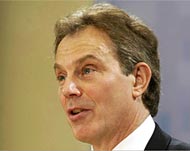Madrid bombs shake Europe to its core
The fallout from the Madrid bomb blasts which killed 202 people is still being felt across the European continent and nowhere more so than the UK.

British officials, in collaboration with their European counterparts, are actively considering creating a continent-wide intelligence service similar to the US‘s Central Intelligence Agency.
“The EU member states have been looking at the possibility of closer relations between European intelligence services for some time,” the British MP and former government minister, Glenda Jackson, told Aljazeera.net.
“But as a result of the terrible outrage in Madrid, I understand that they are now seriously discussing the possibility of creating some kind of European intelligence agency, which would be an equivalent of the CIA.”
“I hope that the EU interior ministers take the idea further”.
Media debate
Much media debate in the UK has focussed on how an attack similar to the one in Spain might affect a British election. But Jackson, a staunch opponent of the Iraq invasion, said a repeat of the Spanish scenario in the UK would be “highly unlikely”.
Professor John Curtice, a psephologist at Strathclyde University in Scotland, said that while an atrocity in London would be unlikely to have the same effect as in Madrid, it could still influence an election.
 |
|
Implications of the Madrid blast |
“Jose Maria Aznar was facing an opposition party that was opposed to the war and Spain‘s involvement in the occupation, and a general public that agreed with them,” Curtice said.
“The British public is divided down the middle, but we do not have a united political class or a united country. Therefore, the effect might not be so strong, but it would not necessarily be absent either.”
Curtice said that depending on the circumstances, it could cause a swing of 1-2% which could be decisive in a close poll. However, he said it would have no effect on voter apathy.
“People who don’t vote are not particularly leftwing,” he said. “They are just less interested in politics and so less likely to see a difference between the political parties.”
Predictably, apart from the usual suspects on the left, Labour MPs reacted to the crisis in Madrid by rallying around their leader.
Glenda Jackson said that the deposing of Aznar had not had any damaging effects on Tony Blair, the Labour party, or British foreign policy in general.
Dangerous
In common with the Spanish electorate though, she accepted that the war in Iraq had made the world a more dangerous place for those countries which had supported it.
“We were told it would make us safer and it clearly hasn’t,” she said. “The one piece of intelligence information furnished to the government that has proven to be correct, and which the government presumably chose to ignore, was that an attack on Iraq would increase international terror.”
To those sections of the British establishment which supported the invasion though, international “terrorism” rises and falls according to its own simple and timeless rules.
“Terrorism is a crime and the more you give into it, the more you motivate the terrorists,” said Professor Ephraim Karsh of Kings College, London.
The election result in Spain had been a victory for al-Qaida, he told Aljazeera.net. “The consequence is that it is just a matter of time until they attack somewhere else in Europe.”
 |
|
Blair will feel impact of Madrid, |
“Let’s not forget that the wars in Iraq and Afghanistan came after al-Qaida attacked the US. There might have been attacks on London without the war.”
Karsh may appear to be having his cake and eating it too. But rightwing pundits, security officials and politicians in the UK are now united in talking of ‘if ‘ and not ‘when’ Al Qaida will attack London.
Atrocities, they say, will happen because al-Qaida is atrocious, not because of British and US policy in Iraq, Palestine or the Gulf.
“Al-Qaida takes a long view and their aim is world domination,” Karsh said. “They say it openly. People don’t want to listen but that’s what they want and they will attack any obstacle, in their battle to establish a new Islamised world order.”
Concern
The new order which civil liberties campaigners are concerned about though, is one in which organisations like a European CIA could clamp down on the people Karsh holds responsible for al-Qaida’s ‘victory’ in Spain; the peace camp.
“There is no question that a lot of people now very afraid,” the respected campaigner, author and academic, George Monbiot told Aljazeera.net.
|
“The problem is that to ensure that this sort of thing never happens again, we have to be able to punish a government electorally” George Monbiot, |
“I’ve spoken to a lot of people who say they are worried about using public transport in London. It will encourage an atmosphere of fear and, as a result, stricter security measures which could effect civil liberties.”
“Our problem is that we have nowhere among the mainstream parties to turn. The Tories are even more hawkish than Labour. The Liberal Democrats proved to be entirely spineless at opposing the war and the only option is to turn to smaller parties like the Greens or the Respect coalition.”
One alternative which Monbiot champions, is mass non-violent direct action on the streets to force change on government policy from within and without.
In Spain, the key moment in the election campaign is thought to have come when thousands of protestors surrounded the office of Jose Maria Aznar’s Partido Popular, chanting “Your War, Our Deaths”.
But Monbiot argues that street protests alone will not counter the scale of the democratic deficit and threat to civil liberties the British left currently faces.
“The problem is that to ensure that this sort of thing never happens again, we have to be able to punish a government electorally,” he said.
It was Bertold Brecht who famously said that “the people have lost the confidence of the government; the government has decided to dissolve the people and elect another”.
As the ‘War on Terror’ approaches its third year, his words are taking on an added piquancy.